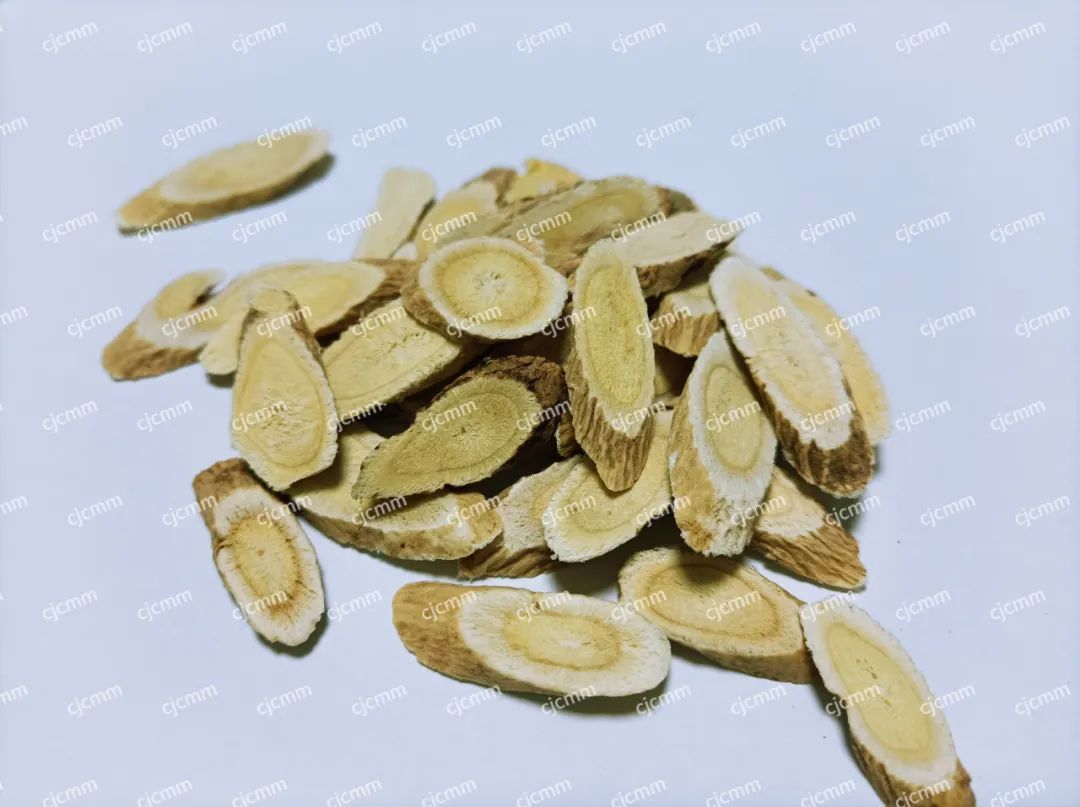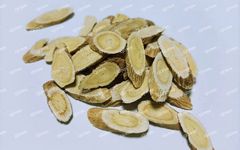 Author | Ban Jin Fu Zi Feeds You Editor | Chun Feng Review | Xiao Ye
Author | Ban Jin Fu Zi Feeds You Editor | Chun Feng Review | Xiao Ye
Recently, I encountered a patient who mentioned that ever since suffering from a severe cold, he has not been able to recover his energy. He feels fatigued every day, despite getting enough sleep, and often feels drowsy.
In the morning, after going downstairs to buy breakfast, he needs to lie on the sofa to rest for a while, and he even experiences a bit of shortness of breath. Strangely, he also feels excessively thirsty and has not put down his thermos cup.
Upon examining his tongue and pulse, I found his tongue to be swollen with teeth marks, a thin white coating, and a pulse that was deep, slow, and weak, particularly at the Guan position. This corresponds to the “Qi Deficiency with Qi Sinking” syndrome described by Zhang Xi-chun, so I used the Sheng Xian Decoction for treatment, and after five doses, his symptoms were basically resolved.


What is “Qi Sinking”?

You may have heard of various types of Qi, such as Zheng Qi (Upright Qi), Xie Qi (Evil Qi), Lung Qi, and Spleen Qi, but “Da Qi” (Great Qi) is not commonly mentioned. This term first appeared in Zhang Xi-chun’s “Medical Records of Traditional Chinese Medicine and Western Medicine”.
The book clearly states that “Da Qi” refers to the “Zong Qi” (Ancestral Qi) mentioned in the “Huangdi Neijing” (Yellow Emperor’s Inner Canon). The sinking of Da Qi indicates a deficiency of Zong Qi, which makes it easier to understand.
Zong Qi is primarily composed of the clear Qi inhaled by the lungs from the natural environment and the essence of food transformed by the spleen and stomach. To weaken Zong Qi, there are two pathways: the lungs and the spleen.
First, regarding the lungs, after a severe cold, the Lung Qi, which has been harmed by the six excess pathogenic factors, has not yet recovered. If the clear Qi inhaled by the lungs is insufficient, the generation of Zong Qi will be inadequate, leading to symptoms of shortness of breath and difficulty in breathing. If not intervened, this can further lead to Zong Qi sinking, resulting in fatigue, thirst, and even organ prolapse.
Next, concerning the spleen, irregular eating habits and insufficient food intake are common causes. Some may wonder why insufficient food intake leads to inadequate transformation of the essence of food, and why eating more does not help. Isn’t it possible to transform more essence?
It is important to understand that the spleen and stomach have a limited capacity for transformation. Within that limit, eating more can indeed help, but exceeding that limit can harm the Qi of the spleen and stomach, leading to symptoms such as loose stools and diarrhea. If the condition progresses, symptoms of Zong Qi sinking may also appear.
Another special cause is being startled. In Traditional Chinese Medicine, it is often said that “fear causes Qi to descend”. Some individuals may experience diarrhea, enuresis, forgetfulness, and fatigue after being frightened, which also falls under the category of Qi sinking.


Sheng Xian Decoction
 Sheng Xian Decoction originates from Zhang Xi-chun’s “Medical Records of Traditional Chinese Medicine and Western Medicine” and is composed of Huang Qi (Astragalus), Zhi Mu (Anemarrhena), Chai Hu (Bupleurum), Jie Geng (Platycodon), and Sheng Ma (Cimicifuga). It has the effect of tonifying Qi and lifting the sinking Qi, primarily treating the syndrome of Qi sinking in the chest, with symptoms including shortness of breath, difficulty in breathing, fatigue, diarrhea, forgetfulness, dry throat, thirst, spontaneous sweating, organ prolapse, a swollen tongue with teeth marks, and a deep, slow, weak pulse, particularly at the Guan position. The composition and dosage are: Huang Qi18g, Zhi Mu9g, Chai Hu5g, Jie Geng5g, Sheng Ma3g.Huang Qi is slightly warm in nature, sweet in flavor, and enters the spleen and lung meridians. It has the functions of tonifying Qi, lifting Yang, benefiting the Wei Qi, consolidating the exterior, promoting water metabolism, reducing swelling, generating fluids, nourishing blood, moving stagnation, relieving pain, expelling toxins, and promoting wound healing. Huang Qi is a key herb for tonifying Qi, and those who often study health knowledge are familiar with it. When feeling a bit fatigued in daily life, they often use Huang Qi slices to brew as a tea. From its meridian entry, it is evident that Huang Qi is best at tonifying the Qi of the lungs and spleen, which aligns perfectly with the source of generating “Da Qi”, replenishing the Qi of the lungs and spleen, thus naturally alleviating symptoms of fatigue and shortness of breath. Additionally, Huang Qi can also lift Yang. As mentioned earlier, this formula treats the “Qi sinking” syndrome, and since there is a “sinking” aspect, it needs to be lifted. Therefore, symptoms such as diarrhea and organ prolapse caused by Qi sinking also fall within the treatment scope of Huang Qi.
Sheng Xian Decoction originates from Zhang Xi-chun’s “Medical Records of Traditional Chinese Medicine and Western Medicine” and is composed of Huang Qi (Astragalus), Zhi Mu (Anemarrhena), Chai Hu (Bupleurum), Jie Geng (Platycodon), and Sheng Ma (Cimicifuga). It has the effect of tonifying Qi and lifting the sinking Qi, primarily treating the syndrome of Qi sinking in the chest, with symptoms including shortness of breath, difficulty in breathing, fatigue, diarrhea, forgetfulness, dry throat, thirst, spontaneous sweating, organ prolapse, a swollen tongue with teeth marks, and a deep, slow, weak pulse, particularly at the Guan position. The composition and dosage are: Huang Qi18g, Zhi Mu9g, Chai Hu5g, Jie Geng5g, Sheng Ma3g.Huang Qi is slightly warm in nature, sweet in flavor, and enters the spleen and lung meridians. It has the functions of tonifying Qi, lifting Yang, benefiting the Wei Qi, consolidating the exterior, promoting water metabolism, reducing swelling, generating fluids, nourishing blood, moving stagnation, relieving pain, expelling toxins, and promoting wound healing. Huang Qi is a key herb for tonifying Qi, and those who often study health knowledge are familiar with it. When feeling a bit fatigued in daily life, they often use Huang Qi slices to brew as a tea. From its meridian entry, it is evident that Huang Qi is best at tonifying the Qi of the lungs and spleen, which aligns perfectly with the source of generating “Da Qi”, replenishing the Qi of the lungs and spleen, thus naturally alleviating symptoms of fatigue and shortness of breath. Additionally, Huang Qi can also lift Yang. As mentioned earlier, this formula treats the “Qi sinking” syndrome, and since there is a “sinking” aspect, it needs to be lifted. Therefore, symptoms such as diarrhea and organ prolapse caused by Qi sinking also fall within the treatment scope of Huang Qi.

Chai Hu is slightly cold in nature, with a pungent and bitter taste, and enters the liver and gallbladder meridians. It has the effects of dispersing heat, relieving liver Qi stagnation, and lifting Yang Qi. The dosage of Chai Hu is important to discuss. There is a saying regarding its dosage: “small amounts lift Yang, moderate amounts relieve liver Qi, large amounts disperse heat”. In this formula, Chai Hu primarily assists Huang Qi in lifting the sinking Qi, so a small dosage of about 3-6g is sufficient. This is also the case in other formulas like Bu Zhong Yi Qi Decoction; for relieving liver Qi stagnation, a moderate dosage of about 6-15g is used, as seen in formulas like Si Ni San and Chai Hu Shu Gan San, which excel at relieving liver Qi stagnation. Large dosages are used to exert Chai Hu’s heat-dispersing effects, often requiring over 30g to clear the Shaoyang heat and promote the Shaoyang Qi mechanism, as in Xiao Chai Hu Decoction.Sheng Ma is slightly cold in nature, with a pungent and slightly sweet taste, and enters the lung, spleen, stomach, and large intestine meridians. It has the effects of releasing the exterior, clearing heat, detoxifying, and lifting Yang Qi. The name itself suggests that Sheng Ma has the properties of lifting and promoting. If there is heat in the body, Sheng Ma can be used to clear it; if there are rashes, it can be used to release the exterior and treat various skin diseases. In this formula, Sheng Ma and Chai Hu both assist Huang Qi in lifting the sinking Qi. It is important to note that the dosages of Chai Hu and Sheng Ma should not be too large, as their primary function is to lift the Da Qi. If their dosages exceed that of Huang Qi, the formula will only have the lifting power without the Qi tonifying effect. Without sufficient Qi, even strong lifting power will be of no use.Zhi Mu is cold in nature, bitter in taste, and enters the lung, stomach, and kidney meridians. It can clear lung fire, cool stomach fire, and drain kidney fire, as well as clear damp-heat and reduce deficiency heat. Its sweet and bitter flavor, along with its cold and moist nature, has the effect of nourishing Yin and moistening dryness. You may wonder why Zhi Mu, which clearly treats heat syndromes, is included here when no heat symptoms have been mentioned. This is certainly not a mistake by Zhang Xi-chun. While Zhi Mu does treat heat syndromes, whether in Bai Hu Decoction for clearing great heat in the Qi level or in Suan Zao Ren Decoction for treating internal disturbance due to deficiency heat, Zhi Mu is present. However, in this case, Zhi Mu’s role is primarily to moderate the warm nature of Huang Qi, rather than to clear heat from the patient.Jie Geng is neutral in nature, with a pungent and bitter taste, and enters the lung meridian. It has the effects of promoting lung function, resolving phlegm, benefiting the throat, and guiding other herbs upward. Jie Geng often serves as a guide in many formulas, and this one is no exception. The previous herbs both tonify Qi and lift it, but where should the Qi be directed? Jie Geng will lead the medicinal properties directly to the chest, guiding them in the right direction.
▋Application
Recommended Products
Learn about classic formulas, use classic formulas, and take health into your own hands. You can look it up and use it without needing to consult others. Classic formula manuals are available for purchase by clicking the mini-program below!

The content of this article is for reference only. Non-professionals in Traditional Chinese Medicine should not attempt to self-medicate.Original submission: [email protected] (email), chunfeng52566 (WeChat)

